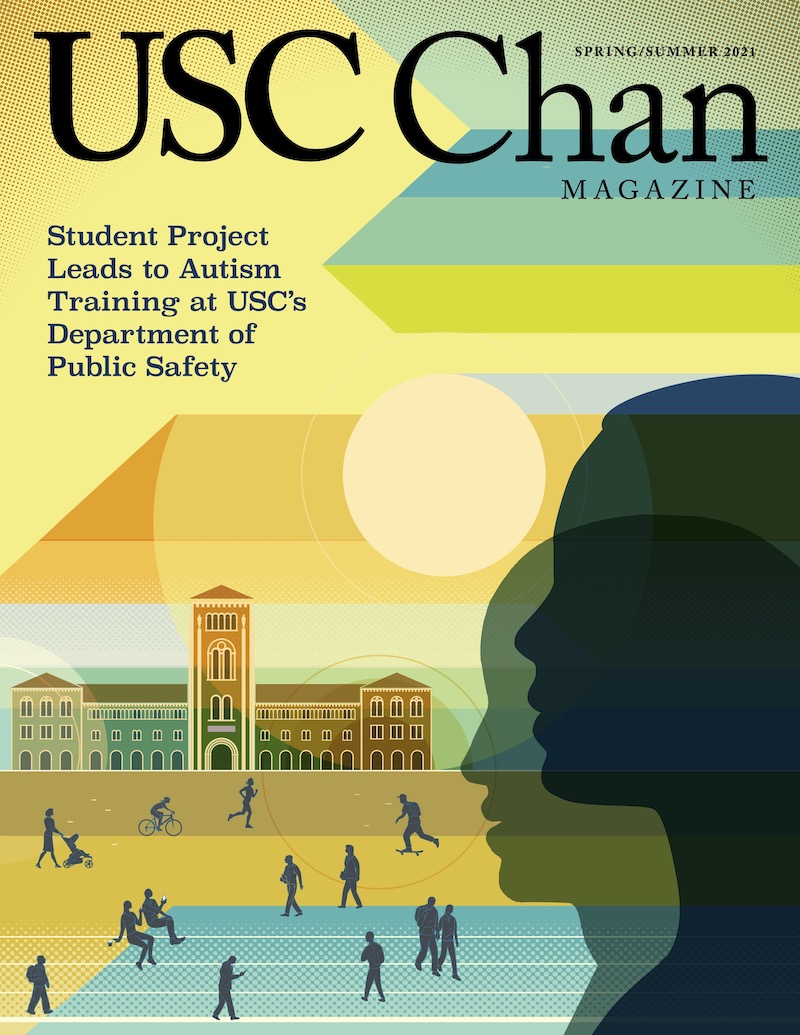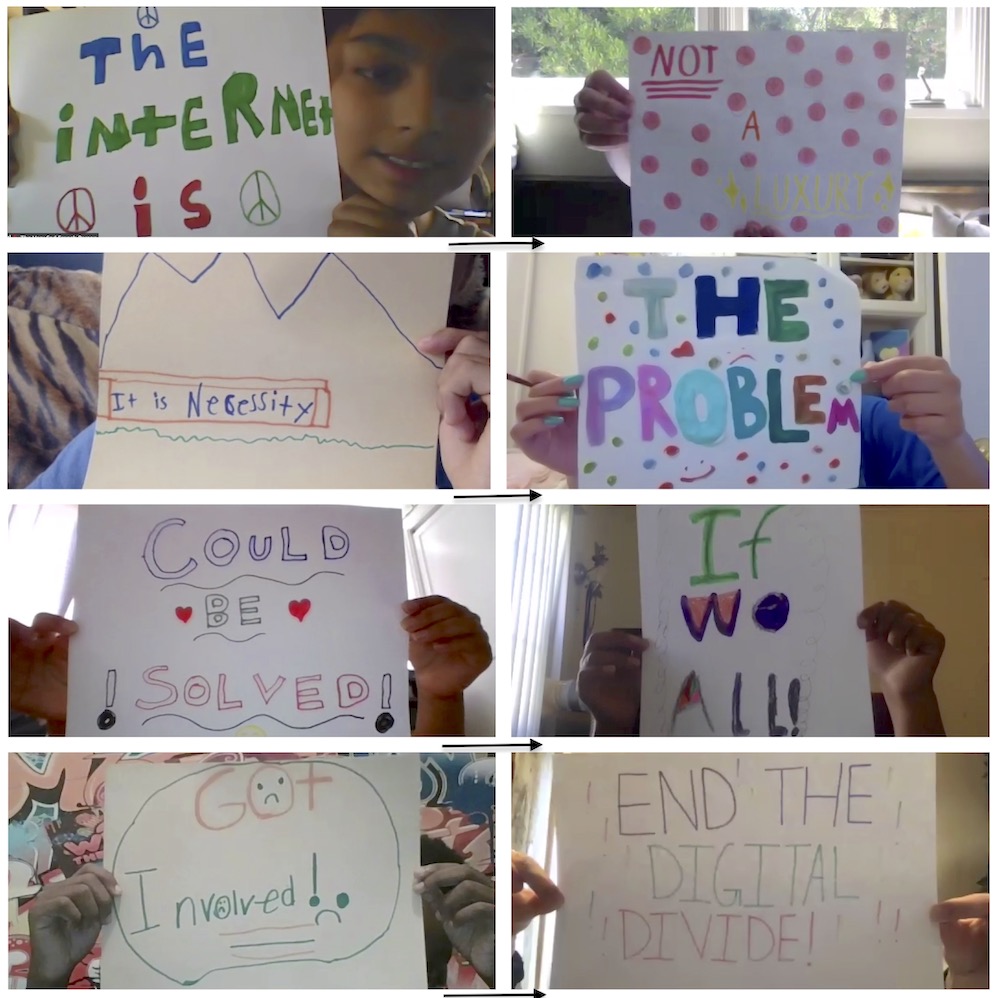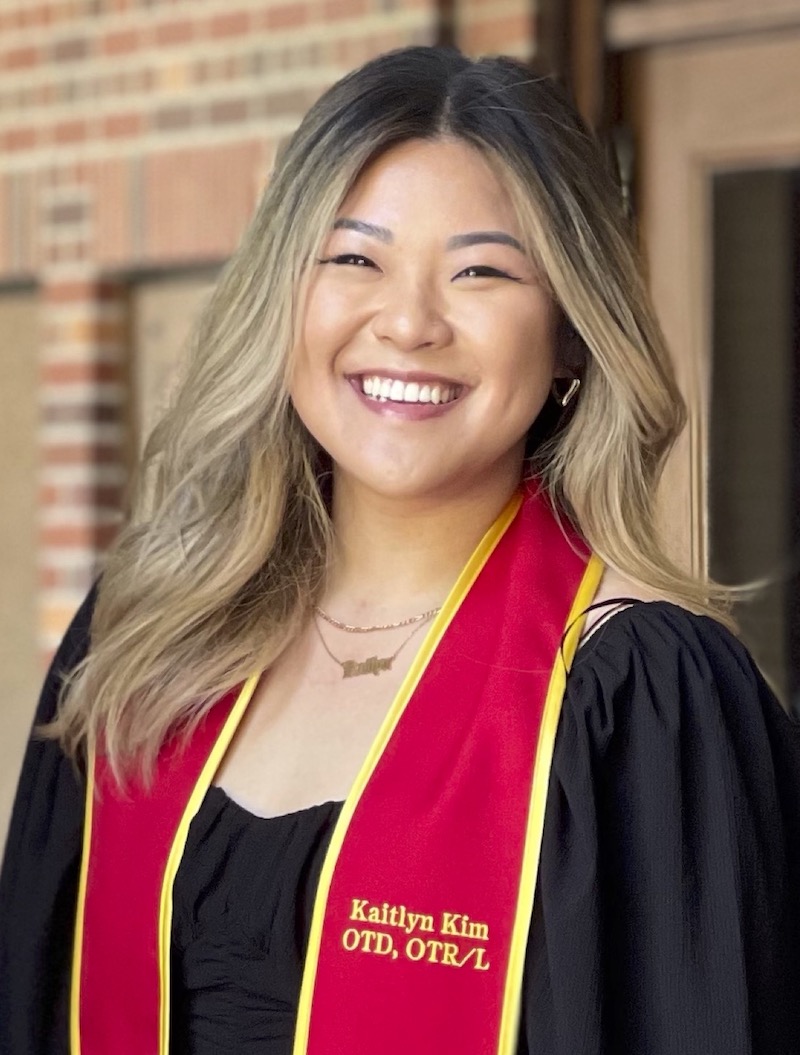Let There Be Peace
How my pandemic fieldwork experience made me an occupational and social justice practitioner.
By Kaitlyn Sun Kim MA ’20, OTD ’21
When COVID-19 struck, my previously confirmed fieldwork placement at an inpatient adult rehabilitation setting in Chicago was cancelled just two weeks prior to my start date. I was overwhelmed by uncertainty and fear. Would I be able to secure a placement in order to graduate on time? And if I did, would it be in-person or remote? And if remote, how would it equip me to become a competent entry-level occupational therapist? Los Angeles County’s “Safer at Home” order in March 2020 settled those questions, and all second-year master’s students were notified that fieldwork would be occurring remotely.
The USC Chan Division rapidly worked to accommodate 140 students from the Class of 2020 to complete their Level II fieldwork to still be eligible for professional certification. I had still hoped for a miracle, allowing me to be placed in an inpatient adult rehabilitation setting, but realistically, I prepared myself to accept any placement that would qualify me to take the National Board for Certification in Occupational Therapy® exam.
My placement in a pediatric fieldwork site at SOLA Community Peace Center came as both a relief and a challenge. My task, along with 15 other Level II students in my cohort, would be to redesign and deliver an online version of SOLA’s annual summer Peace Camp, a program for South Los Angeles youth to build peacemaking skills and make positive social impacts. Pandemic aside, I never could have imagined participating in a practice setting focused on “occupational and social justice.” How could I gain the necessary experience there to become an entry-level occupational therapist?
Expectations about “real” occupational therapy practice
SOLA describes its vision “to offer life-transforming peace programs in order to create a more peaceful and just community and world . . . [by providing] peace education to young people, families and community members, particularly those who are economically disadvantaged . . .” SOLA’s Peace Camp works with mainly Latinx children and teens living in the low-income South Los Angeles neighborhoods around USC’s University Park Campus. I had just completed an advanced occupational science seminar that exposed me to cutting-edge concepts such as occupational justice and occupational reconstruction, but those ideas seemed mostly theoretical at the time.
Yet similar concepts had been put into practice for 15 years by SOLA’s executive director and USC Chan alumna Susan Stouffer PhD ’07. Dr. Stouffer’s path to developing occupation-centered social justice programing began with her graduate student internship, which included a youth peace program sponsored by USC’s on-campus United University Church. When the church relocated, Dr. Stouffer worked to found SOLA Community Peace Center as an independent, secular non-profit 501(c)3 organization. Partnering with USC Chan to provide a practice site for occupational therapy students was one of Dr. Stouffer’s top priorities.
Expectations are shaped by experiences. My first Level II fieldwork was at an inpatient psychiatric hospital, where I succeeded in meeting the fast-paced, ever-shifting demands of inpatient care. My idea of “real” occupational therapy practice included formal assessments and evaluations, intensive documentation, reimbursement and successful discharges with measurable outcomes. So a 12-week placement at SOLA challenged my emerging professional identity. I thought to myself, “I don’t want to be a summer camp counselor; I don’t want to babysit kids; How is this even considered occupational therapy?”
Meeting people where they are
Our first week at SOLA oriented us to Peace Camp and its 14-year track record. We learned more about our goal to create and deliver an online version of the program, in collaboration with SOLA’s staff and participants. It became clear to us that SOLA’s response to the COVID-19 crisis was taking place in real time, just as rapidly as we were trying to adapt. The rest of that first week was filled with in-service lectures and discussions concerning pediatric practice, online and telehealth service delivery, family systems, the history and context of South Los Angeles, theories of occupational and social justice and the emerging occupational reconstruction practice framework.
This was the point where collaboration between Dr. Stouffer and my clinical instructor, Assistant Clinical Professor Kristy Payne MA ’16, OTD ’17, really took off. Their ability to assess and organize resources, personnel, goals and desired program outcomes was occupational therapy in its purest form. No, this was not the traditional pediatric site we had signed up for. We wouldn’t be leading one-on-one sessions, completing the usual documentation, performing typical occupational therapy evaluations or implementing standardized assessments. But we were learning — by observing and by doing — how to creatively restructure a complex, high-stakes situation to reach desired outcomes. This reconstruction of Peace Camp included and respected the voices of local families, the campers in their age-graded groups from 5 to 18 years old, the staff hired from the community and us fieldwork students.
Engagement through problem-solving
As the weeks went by and my understanding of SOLA’s role increased, I felt myself becoming ever more committed to Peace Camp. My insights into the community were less and less informed by what others had told me, and based more upon the ways that my colleagues and I worked to overcome specific hurdles. We had to resolve how best to adapt the program to the virtual environment, how to assess and stimulate campers’ engagement and how to manage structural inequalities, including many families’ limited internet access. While I worked closely with the youth interns, the transition to Zoom made it almost impossible to build rapport. My confidence plummeted with every awkward silence during our group discussions. Although we often felt defeated, this disengagement did not stop us fieldwork students from developing guidelines for better practice. We created and implemented informal needs assessments to gauge interests. Through discussions, we landed on topics focused on leadership, stress and time management, careers, sleep hygiene, resumé writing and professionalism.
A transformative change — one I will remember for the rest of my life — occurred when we experimented with role-playing scenarios to foster the youth interns’ leadership skills. The fieldwork students played the roles of campers, while the interns played the roles of group leaders. We fieldwork students played our roles by throwing temper tantrums, saying unkind things to one another and refusing to participate. The interns loved it! Their engagement skyrocketed, and unlike previous sessions, their smiles and laughter filled the Zoom screen. From that moment on, their individual personalities began to radiate, and I finally saw a glimmer of hope for my own evolving leadership skills.
Our work was frequently interrupted by external issues related to internet access and connectivity. It’s been a common problem facing underserved communities, and has only been exacerbated by the pandemic. Many of our campers had trouble attending sessions or fully participating, and campers often had trouble with their webcams due to limited bandwidth. We thought about how to bridge this “digital divide” and empower our campers as agents capable of improving conditions in their community.
One project involved writing to U.S. Senator Dianne Feinstein, who responded back to us: “More must be done to ensure students are not left behind during this difficult time.” Feinstein described her co-sponsorship of a Senate bill to allocate $4 billion to improve students’ internet access, allowing them to continue learning remotely. By facilitating direct contact with a senior representative, we built our campers’ awareness of, and capacity for, mechanisms for cooperative action. Obviously we were doing so much more than simply “babysitting.”
The meaning of occupational therapy
The challenge of virtual fieldwork in an emerging practice area unleashed my creativity, clinical reasoning and ability to connect with the community. Over the course of those 12 weeks, I came to realize that everything we did at Peace Camp could be defined as legitimate occupational therapy. I became adept at many of the traditional skills I feared I would otherwise miss, such as informal needs assessments, activity-based interventions, task analysis, grading and scaffolding activities, social skills, program development, socio-emotional learning, building rapport, understanding and working with individuals in context and advocating for an underserved community. I also fell in love with the South Los Angeles community where SOLA offers peace and justice programs. Now that I am a registered and licensed occupational therapist, I am continuing to build upon this foundation as SOLA’s first doctoral resident. My leadership skills continue to develop with new responsibilities and creative opportunities, and I am excited to use my OTD residency to build curricula and programs around social justice, and to find ways to expand occupational therapy practice in the community using this partnership as a template.
This fieldwork experience opportunity opened up new doors for me, and expanded my understanding of occupational therapy. As the pandemic continues, I offer this advice to those students who may be worried about their own fieldwork placements: Be open to the experiences that are available to you, because every experience is a learning experience. No matter where you complete your fieldwork, you will have a strong foundation from your USC education to become a competent entry-level occupational therapist. You may find, as I did, some invaluable skills and experiences that are not yet taught in any textbook.
⋯








